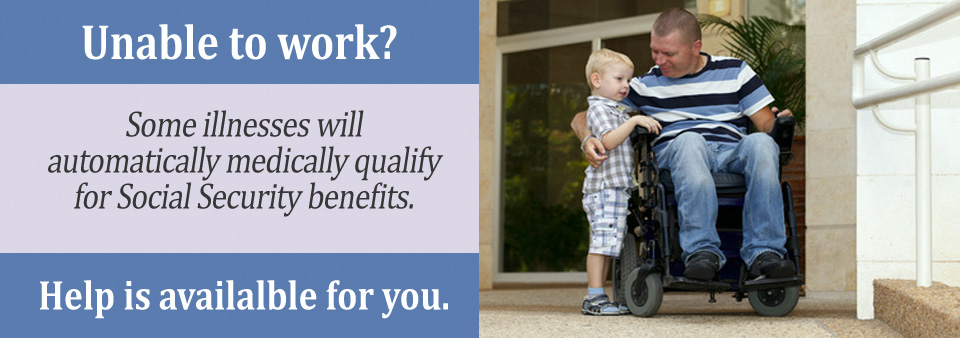60 million people in the United States currently receive monthly Social Security benefits.
While the majority of these benefits aid older, retired Americans, a large portion is comprised of Social Security disability insurance (SSDI). If you are looking to apply for SSDI, it is useful to learn how the Social Security Administration evaluates disabilities.
If you have a very severe disability, or perfectly meet the SSA's guidelines for being disabled, you may have an easier time getting approved than others.
Can Certain Conditions Get Approved for Disability Automatically?
Yes — some disabilities are automatically approved for benefits by the Social Security Administration (SSA). However, this does not mean that they are the only disabilities that qualify for insurance. To understand this, we must first understand Social Security’s medical guide used to evaluate every application, known as the “Blue Book”.
The Blue Book is the SSA’s guide to severely disabling impairments. Within the book are listed various disabilities for Adults (Part A) and Children (Part B) that qualify to receive disability insurance. The Blue Book covers a range of severe impairments, from terminal cancer to Cerebral Palsy to Trisomy 21 Down Syndrome.
If you have a disability that is listed in the Blue Book and have the medical documentation to support your diagnosis, you can apply via the SSA’s online application to work towards receiving insurance.

Medical Conditions for Disability Approval
While many medical problems qualify for SSDI and SSI benefits, some medical conditions are more likely to result in benefits approval than others. To be granted disability payments based on a specific illness or condition, an applicant filing for Social Security disability benefits does not have to meet the exact listing requirements for that condition. If the SSA finds components of your condition to be medically equivalent to the criteria in the listing or a related listing, you may be eligible for disability benefits.
Compassionate Allowances and Social Security Disability
Some illnesses are so clearly disabling, the SSA will expedite the approval process. These are known as Compassionate Allowances. The SSA's Compassionate Allowances list is usually the best way to identify what medical conditions automatically qualify for disability.
The SSA's Compassionate Allowances list includes advanced forms of cancer, ALS, and more. If you apply with a Compassionate Allowance, you can expect to be approved in as little as 10 days.
If you have a disability that is not covered in the Blue Book, you may still be eligible to receive SSDI. Severe, unlisted disabilities can still qualify for “medical vocational allowances”. These disabilities are not pre-approved, but are debilitating enough to prevent you from earning sufficient wages and living an independent life.
Medical Vocational Allowances and Disability Benefits
To receive a medical vocational allowance, you must provide proof of your disability and the reason it prevents you from living normally. This includes doctors’ notes, evaluations, medical bills, work history, and any other documents that demonstrate your disability to the SSA. If your case is approved, you qualify for insurance and can begin receiving monthly payments to assist you.
Regardless of how your disability is approved, however, the SSA will continue to check up on your status to see if you still require disability insurance. For terminal, incurable, or life-long diagnoses, check-ups are only performed once every 7 years. For other disabilities, check-ups happen either once every 3 years or once every 12 months. To be sure that your check-ups go smoothly, it is important to always keep medical records and other documentation of your disability organized and ready to present to the SSA.
How to Get Approved for Disability Benefits
The main reason for being eligible for a disability benefit is having a medical condition that is severe enough that it is listed in the Social Security Administration’s (SSA’s) Blue Book. You need to match specific criteria before you will be approved for a disability benefit. This means providing the following:
- medical evidence that you medically qualify such as your doctor’s report with your diagnosis and the results of any medical tests that support your diagnosis;
- proof that you are unable to work for at least 12 months which can be confirmed by the results of a Residual Functional Capacity Assessment (RFC) conducted by an examiner appointed by the SSA or sometimes the SSA will approve your doctor to undertake an RFC
- response in a timely manner to any requests from the SSA which means when the SSA requests any further proof of your medical condition you respond with the required information as quickly as you can;
- that you have enough work credits to qualify so the SSA can approve your disability claim. In 2021 workers you gained one work credit for every $1,470 received from company wages or self-employment. The SSA calculates the number of work credits required in order to qualify for disability benefits by referring to the age when the applicant first experienced symptoms of a disability.
If you believe your medical condition will qualify you for a disability benefit, a lawyer may also help you get approved far more quickly than if you applied on your own.
Next Steps to Take
Even for pre-approved disabilities, the process of applying for Social Security can be a complicated one. If you are considering applying for SSDI, the best choice you can make is consulting with a Social Security attorney. They are well-versed in handling paperwork, presenting cases favorably, and overall making the process easier to understand. Applicants with legal representation are also approved statistically more often than those without.
If you have questions about SSDI and your disability, consider speaking with a Social Security attorney about your options. If your claim is denied disability, you can still qualify. Work with a lawyer to file an appeal.